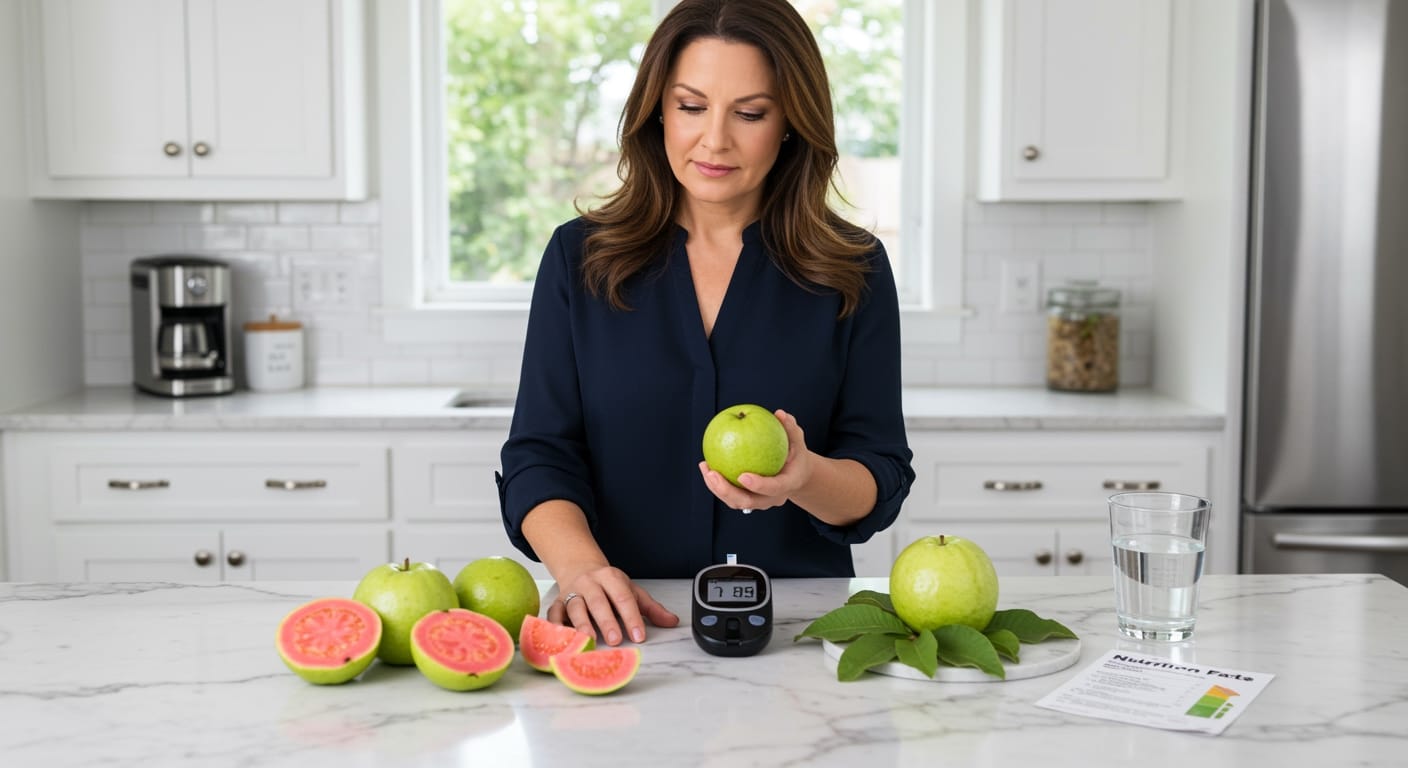✪ Key Takeaway: Guavas are excellent for diabetes due to their low glycemic index, high fiber content, and blood sugar stabilizing compounds.
Introduction
You stare at the colorful guava in your hand and wonder if this sweet tropical fruit will send your blood sugar soaring.
Many people with diabetes avoid fruits entirely because they fear the natural sugars will cause dangerous spikes in their glucose levels.
Hi, I’m Abdur, your nutrition coach and today I’m going to explain exactly how guavas affect your blood sugar and why they might be one of the best fruit choices for diabetes management.
What Makes Guavas Different From Other Fruits?
Guavas stand out from other fruits because of their remarkably low glycemic index of just 12-24.
This means guavas cause a much slower and gentler rise in blood sugar compared to high-glycemic fruits like watermelon or pineapple.
The secret lies in guavas’ unique fiber composition and natural compounds that work together to slow sugar absorption.
When you eat a guava, the high fiber content forms a gel-like substance in your digestive tract that slows glucose absorption into your bloodstream.
This process happens at the cellular level where fiber molecules bind with sugar molecules, creating a time-release effect that prevents sudden blood sugar spikes.
Research shows that guavas contain quercetin and other flavonoids that enhance insulin sensitivity and help your cells use glucose more effectively.
✪ Fact: One medium guava contains 9 grams of fiber, which is 36% of your daily fiber needs.
How Do Guavas Affect Your Blood Sugar Response?
When you eat guavas, your body experiences a gradual glucose release rather than the sharp spikes caused by processed foods.
The natural sugars in guavas are primarily fructose and glucose, but they come packaged with fiber, water, and beneficial compounds that moderate their absorption.
Your digestive system breaks down guava sugars slowly because the fiber matrix requires more time and energy to process.
At the molecular level, the fiber in guavas activates incretin hormones in your intestines that signal your pancreas to release insulin in a controlled manner.
This natural mechanism helps prevent the insulin overshooting that often occurs with high-glycemic foods and leads to blood sugar crashes.
Studies demonstrate that people who eat guavas regularly show improved postprandial glucose control, meaning their blood sugar remains more stable after meals.
✪ Pro Tip: Eat guavas with the skin on to maximize fiber intake and blood sugar benefits.
Can Guava Leaves Help With Diabetes Management?
Guava leaves contain powerful compounds that may be even more beneficial for diabetes than the fruit itself.
Research reveals that guava leaf extract contains polyphenolic compounds that inhibit alpha-glucosidase enzymes in your small intestine.
These enzymes normally break down complex carbohydrates into simple sugars, so blocking them helps reduce glucose absorption from your meals.
Traditional medicine has used guava leaf tea for centuries to manage blood sugar, and modern science now confirms its anti-diabetic properties.
The active compounds in guava leaves work at the cellular level by improving insulin receptor sensitivity and enhancing glucose uptake by muscle cells.
Clinical studies show that drinking guava leaf tea before meals can significantly reduce post-meal blood sugar spikes by up to 25 percent.
✪ Note: Always consult your healthcare provider before using guava leaf tea as it may interact with diabetes medications.
What Is The Best Way To Include Guavas In Your Diet?
The timing and portion size of guava consumption can significantly impact your blood sugar response.
Eating one medium-sized guava as a snack between meals provides steady energy without causing glucose spikes.
You can maximize the blood sugar benefits by pairing guavas with a small amount of healthy protein or fat like nuts or Greek yogurt.
This combination further slows sugar absorption and helps maintain stable glucose levels for longer periods.
Fresh guavas are always better than processed guava products like juices or jams, which remove the beneficial fiber and concentrate the sugars.
The best time to eat guavas is during the day when your insulin sensitivity is naturally higher, rather than late at night when glucose tolerance decreases.
✪ Pro Tip: Monitor your blood sugar 2 hours after eating guavas to understand your individual response.
The Bottom Line
Guavas are not only safe for people with diabetes but can actually help improve blood sugar control when eaten as part of a balanced diet.
The best foods for diabetes are often the ones that nature provides in their whole, unprocessed form.
I would love to hear about your experience with guavas and blood sugar management, so please share your thoughts or questions in the comments below.
At NutritionCrown, we use quality and credible sources to ensure our content is accurate and trustworthy. Below are the sources referenced in creating this article:
- Frontiers in Pharmacology: Guava and Diabetes Research
- PubMed Central: Guava Leaf Extract Effects
- January AI: Glycemic Index of Guava





